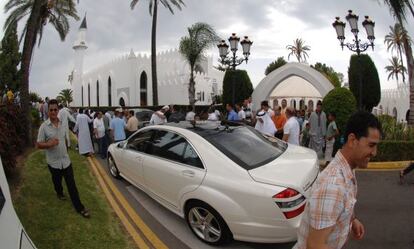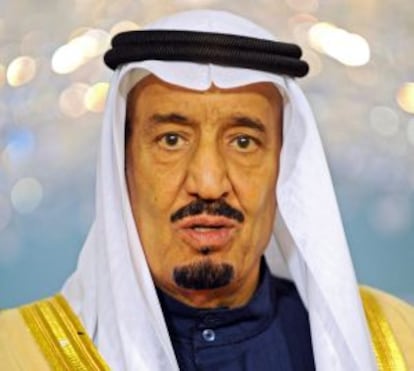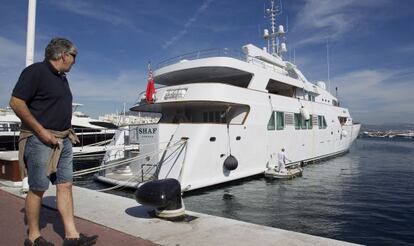Marbella’s ‘amigo’ Salman
The new Saudi king has visited the Málaga resort every summer for the last three decades

The Saudi royal family’s connection with Marbella dates back more than 40 years, when Prince Fahd, who would rule Saudi Arabia between 1982 and 2005, decided to vacation there, later building a number of luxury properties. Now the Mediterranean resort is celebrating the ascent to the throne of Salman bin Abdulaziz, known locally as amigo Salman, and no stranger to Marbella.
The Saudi royal family’s long-standing ties to Marbella have given rise to any number of stories: that the local branch of El Corte Inglés department store is at its disposal 24/7; that when it comes to town it brings with it hundreds of retainers, who all require the services of Marbella’s professionals and self-employed... There are no exact figures on the impact on the economy of Marbella, admits Chela Figueira, head of the town’s communication department, “but it’s evident they generate wealth.”
Despite the legends about excesses, the life of the Saudi royal family in Marbella has been characterized by discretion
And do they pay their property tax? “Religiously,” she says.
King Fahd may have helped put Marbella on the map as a Mediterranean playground, but despite possessing a palace and several other properties on a 48,000-hectare chunk of prime real estate called Las Lomas, a hillside overlooking the Golden Mile, the last time he was there was in 2002, and before that, in 1999. But he did have a mosque built in Marbella in 1981, followed by another, for his family’s use, a few years later. He also funded a number of low-cost housing units, as well as a hemodynamic plant at the local hospital. And, of course, he converted Marbella into the summer residence of his extensive family, many of whom have since built their own palaces.
While Fahd’s successor, Abdallah, who died last month, was never seen there, Saudi Arabia’s new King Salman has really made the place a home from home and last visited only last summer. Despite the legends about its excesses, the life of the Saudi royal family in Marbella has been characterized by discretion. Its members have largely kept themselves to themselves, preferring to hire the same suppliers over the years. For example, the first gardeners they hired have in turn recommended other gardeners, and the same goes for their trusted butchers, florists and drivers. They rarely use service companies, instead preferring a personal network. The Saudi Arabian consul in Málaga takes care of any other details, with the usual discretion. The life of the Saudi royal family in Marbella is largely nocturnal, consisting of all-night private parties in their palaces or yachts. They spend the mornings sleeping, and the afternoons shopping.

The children tend to hang out together, and are always under guard, often by off-duty Civil Guard officers without the knowledge of their superiors. Sometimes there is a particularly large party, for which a fleet of Mercedes will be brought in from Germany; or maybe even a wedding, such as in 2011, when Sarah bin Fahd Salman, the king’s granddaughter, married Talal bin Abdulaziz bin Bander, and around a thousand guests turned up. Around 15 orchestras were hired from around the world. The wedding reception was held in La Concepción, a house formerly owned by Juan Antonio Roca, the former head of Marbella’s town-planning department, who is now in jail for corruption.
The Saudi royal family’s connection to Spain’s most glamorous resort dates back to 1973, when Adnan Kashoggi, a Saudi Arabian businessman better known for his links to the arms trade, called his friend Alfonso de Hohenlohe, a member of Marbella’s notorious jet set, to tell him that he had persuaded Prince Fahd to cancel a planned visit to Monte Carlo and visit Marbella instead. The problem was that Hohenlohe’s Marbella Club didn’t have the 32 rooms required by Fahd and his retinue. Count Rudolf Schönburg, better known as Count Rudi, finishes the story: “Alfonso knew that the Incosol clinic had just finished work on a second story, and asked Ignacio Coca if he could spare 32 rooms, and he said yes.”
Fahd landed in Marbella, and moved into the house of some local aristocrats who had lent it to Alfonso for the occasion, which became a kind of suite of the Marbella Club. The following day, Alfonso’s son appeared at lunch weeping because he had lost his beloved falcon. Prince Fahd sent his private plane back to Saudi Arabia to bring the boy not one, but two of his own falcons.

Shortly afterward, the Saudi consul requested permission to build a home for the prince. Meanwhile, the family bought several large properties where they regularly held parties.
Diego Martín Reyes, who was mayor for 17 months between 2006 and 2007 when the Operation Malaya corruption investigation led to Marbella town council being replaced by a management committee, attended an event following Friday prayers. “The whole thing was very much about protocol. We were given cardamom juice in the garden where there were seats with television screens. In the dining room there was a kind of buffet. We drank goat’s milk and there was just about every kind of food. It was very slow because, before sitting down, you had to serve yourself. Then, after a while, Salman made it clear the meal was over. He got up, no more food was served, and a lot of people had no lunch.”
Salman funds the Marbella mosque, which has a Moroccan imam named Allal Bachar El Hosri, an affable and calm man who has lived in Spain for almost 40 years, and now has Spanish citizenship. Bachar says Salman made sure that he held on to his job, despite pressure to appoint an imam with more radical views. “I am a Maliki [the predominant Sunni school of Islam in North Africa] and am here thanks to Salman,” he says.
The Saudi king’s yacht, Shaf London, is moored permanently in Puerto Banus. He has also had a palace built in Tangiers, and spent more time there last summer than in Marbella. The 79-year-old’s health is fragile, and he has early-stage Alzheimer’s.
Marbella’s luxury property market has picked up over recent months. So if amigo Salman, King Salman bin Abdulaziz of Saudi Arabia, visits the town this summer, as he has every year for the last three decades, it might well be taken as a sign that the crisis is over. At least for Marbella.
Tu suscripción se está usando en otro dispositivo
¿Quieres añadir otro usuario a tu suscripción?
Si continúas leyendo en este dispositivo, no se podrá leer en el otro.
FlechaTu suscripción se está usando en otro dispositivo y solo puedes acceder a EL PAÍS desde un dispositivo a la vez.
Si quieres compartir tu cuenta, cambia tu suscripción a la modalidad Premium, así podrás añadir otro usuario. Cada uno accederá con su propia cuenta de email, lo que os permitirá personalizar vuestra experiencia en EL PAÍS.
¿Tienes una suscripción de empresa? Accede aquí para contratar más cuentas.
En el caso de no saber quién está usando tu cuenta, te recomendamos cambiar tu contraseña aquí.
Si decides continuar compartiendo tu cuenta, este mensaje se mostrará en tu dispositivo y en el de la otra persona que está usando tu cuenta de forma indefinida, afectando a tu experiencia de lectura. Puedes consultar aquí los términos y condiciones de la suscripción digital.









































